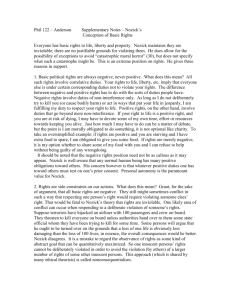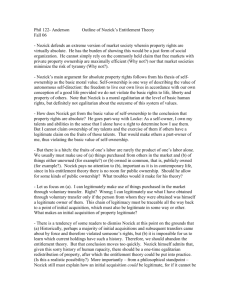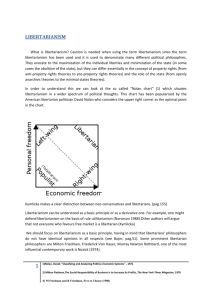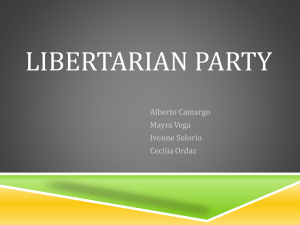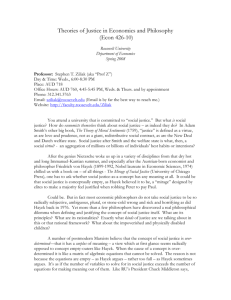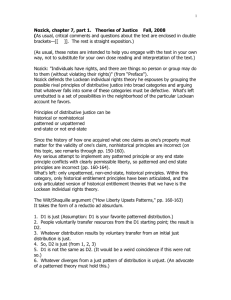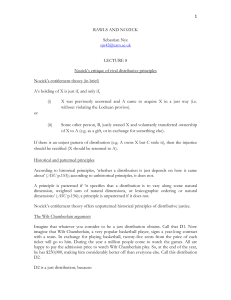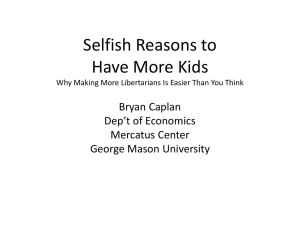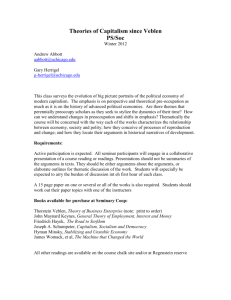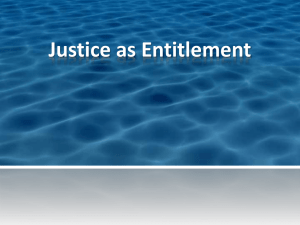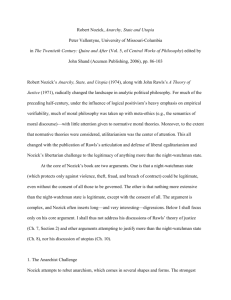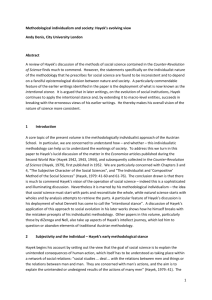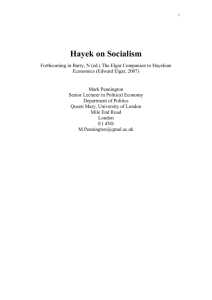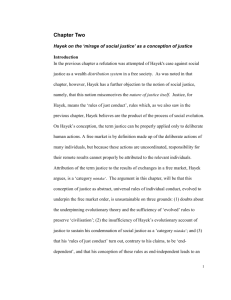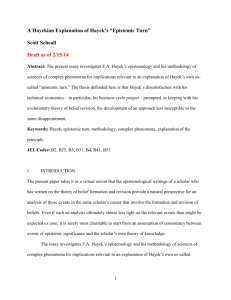Pro libertarianism 2 May
advertisement
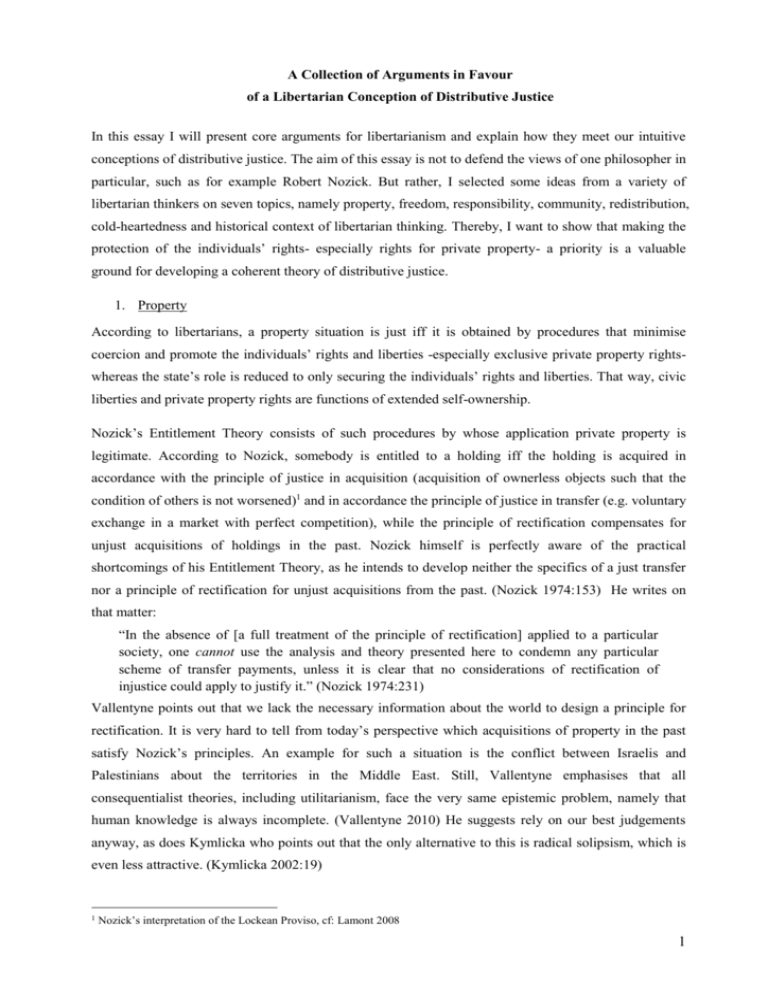
A Collection of Arguments in Favour of a Libertarian Conception of Distributive Justice In this essay I will present core arguments for libertarianism and explain how they meet our intuitive conceptions of distributive justice. The aim of this essay is not to defend the views of one philosopher in particular, such as for example Robert Nozick. But rather, I selected some ideas from a variety of libertarian thinkers on seven topics, namely property, freedom, responsibility, community, redistribution, cold-heartedness and historical context of libertarian thinking. Thereby, I want to show that making the protection of the individuals’ rights- especially rights for private property- a priority is a valuable ground for developing a coherent theory of distributive justice. 1. Property According to libertarians, a property situation is just iff it is obtained by procedures that minimise coercion and promote the individuals’ rights and liberties -especially exclusive private property rightswhereas the state’s role is reduced to only securing the individuals’ rights and liberties. That way, civic liberties and private property rights are functions of extended self-ownership. Nozick’s Entitlement Theory consists of such procedures by whose application private property is legitimate. According to Nozick, somebody is entitled to a holding iff the holding is acquired in accordance with the principle of justice in acquisition (acquisition of ownerless objects such that the condition of others is not worsened)1 and in accordance the principle of justice in transfer (e.g. voluntary exchange in a market with perfect competition), while the principle of rectification compensates for unjust acquisitions of holdings in the past. Nozick himself is perfectly aware of the practical shortcomings of his Entitlement Theory, as he intends to develop neither the specifics of a just transfer nor a principle of rectification for unjust acquisitions from the past. (Nozick 1974:153) He writes on that matter: “In the absence of [a full treatment of the principle of rectification] applied to a particular society, one cannot use the analysis and theory presented here to condemn any particular scheme of transfer payments, unless it is clear that no considerations of rectification of injustice could apply to justify it.” (Nozick 1974:231) Vallentyne points out that we lack the necessary information about the world to design a principle for rectification. It is very hard to tell from today’s perspective which acquisitions of property in the past satisfy Nozick’s principles. An example for such a situation is the conflict between Israelis and Palestinians about the territories in the Middle East. Still, Vallentyne emphasises that all consequentialist theories, including utilitarianism, face the very same epistemic problem, namely that human knowledge is always incomplete. (Vallentyne 2010) He suggests rely on our best judgements anyway, as does Kymlicka who points out that the only alternative to this is radical solipsism, which is even less attractive. (Kymlicka 2002:19) 1 Nozick’s interpretation of the Lockean Proviso, cf: Lamont 2008 1 However, other libertarians developed Nozick’s Entitlement theory further and achieved more promising results. Many of these approaches acknowledge that the division of the world in unowned objects and exclusively private property is far too narrow. Proponents of left-libertarianism suggest that natural resources are the property of everybody. These natural resources need to be shared such that everybody either gets an equal share or is provided with equal opportunities in some other way. (Vallentyne 2010) Whereas left-libertarians introduce public goods, other libertarians expand the Nozick’s Entitlement Theory in another way. Israel Kirzner adds an additional class of holdings, namely “ the holding of a thing as a result of its having been ‘created’”. Thereby, he is able to explain disequilibria in markets as a result of such creations ex nihilo, e.g. technical inventions. These disequilibria cannot be explained by Nozick’s principles of justice in transfer and in acquisition. (Kirzner 1982:404) Although, these libertarians acknowledge the necessity for alternative kinds of ownership apart from exclusive private property, they all share the idea that self-ownership is the most important thing to preserve and promote. They just have different ideas on how this can be done. I cannot present the advantages of all these libertarian approaches in detail within this essay. At this point, I just want to remind us that a valid critique of libertarianism is required to examine the different libertarian approaches in detail. 2. Freedom Another valid way to criticize libertarianism is to show that self-ownership and its implications are not worth promoting. Hayek provides a very plausible response to this objection as he shows that selfownership and extended self-ownership -in the sense of exclusive private property- are necessary for empowering the individuals such that they can be a part of a well functioning and efficient society. Hayek claims that the only way to make sense of the notions of moral responsibility and accountability is to assign exclusive private property rights to individuals. Then, these individuals are entirely responsible for how they intentionally treat their property, because they are not restricted by any kind of morally relevant coercion.2 A libertarian order of society benefits the ethical development of the individuals in another way as well. According to Nozick, end-state principles, such as Rawls’ difference principle, require continuous interference with liberty if they are to be maintained. If on the other hand only a few libertarian procedure laws restrict the individuals’ liberty most life choices are being left up to the individuals. Hence, the state is the most neutral to its inhabitant’s the conceptions of the good as possible. Regarding globalisation and the resulting multicultural societies this neutrality is very important in today’s society. 2 The idea behind that is that a slave cannot be held responsible for she actions because she is forced to act this way. Only if a person acts freely she can be held responsible for her actions. 2 3. Responsibility Both, Hayek and Nozick consider the competitive market to be an excellent tool to organize society. They appreciate the fact, that all transactions taking place in such a market are voluntary and that it is the most efficient way to allocate goods facing incomplete information. (Hayek 2000:183f) Furthermore, Hayek states that, since the market is a chaotic total of a multitude of transactions that nobody controls, the market itself is not something that is either morally right or wrong, because only people’s intentional behaviour has a moral status. “the attribute of justice may thus be predicated about the intended results of human action but not about circumstances which have not deliberately been brought about by men” (Hayek 2000:183) According to Hayek’s conception of moral responsibility, the injustices resulting from market operations are not the result of a bad intention and therefore morally irrelevant. So, Hayek acknowledges that a big area of our life, namely most economic activities, is subject to luck, such that the outcome of our actions cannot really be judged morally. Therefore, Hayek argues that the term “social justice” does not hold any meaning in a market-based society. Even though, this sharp distinction between situations where somebody can be held morally responsible and situations where chaos and luck play such important roles appears to be quite cruel, I hope, I have been able to show that it is persuasively derived very plausible premises, such as the necessity for selfownership. However, this leaves the question whether libertarianism overestimates the individual’s responsibility and underestimates communal responsibilities. 4. Community It is misleading to think of libertarianism as neglecting the communal aspect of the human existence. Whereas libertarians strongly oppose the idea of sacrificing the individual’s freedom for the sake of communal issues they acknowledge the need for community among people. According to Nozick, a libertarian society should consist of a variety of communities in which people share a certain conception of the good. The communities compete against each other for their members, since the individuals are able to choose freely which community they want to join. Within the communities, bigger social duties that restrain personal liberties, might emerge, but every person either voluntarily accepts them or leaves the community for another one. An example for such communities in today’s world is the kibbutz movement in Israel, where people live in socialist communities within a ‘liberal’ state. 5. Coercive redistribution In order to maximise the individuals’ liberty the coercive forces of the state must be minimised. Therefore libertarians are sceptical of redistribution by taxation because that way property rights are violated. Hayek points out that any state that pursues the implementation of some scheme of distributive justice becomes more and more totalitarian by doing so. (Hayek 2000:182) However, libertarian entitlement theories are certainly more complex and nuanced than a mere ‘finder& keeper ethics’. Most 3 of them contain elements of recompensation or redistribution, such as Nozick’s interpretation of the Lockean proviso. Steiner(1982:381) 6. Cold-heartedness Libertarianism has been accused of being too insensitive towards social issues. Libertarians, such as Hayek, accept that luck plays a major role in a person’s life for the better or for the worse. Still, they strongly oppose any coercive compensation mechanism for this. However, some libertarians, such as Hayek and Friedman, support a minimum guaranteed income in order to avoid sheer luck deciding upon life and death of somebody. In my opinion people identify with their choices on a deeper level in a libertarian society than if they were coerced to act that way, since all their commitments are voluntary. This identification makes people putting more effort in the realisation of their projects and makes accepting greater personal sacrifices for their projects. Therefore, the sense of community within people who work for the same project would be very strong and most certainly stronger than in an anonymous welfare state, where people only pay taxes because they have to. Hence, the people’s propensity for philanthropy in a libertarian society would be much stronger than the people’s propensity to pay high taxes in a welfare state. 7. Historical context While reading the work’s classical libertarians such as Hayek and Nozick I notice their radical and widespread scepticism towards state institutions and unwillingness to look out for middle grounds or reconciliation with other theories of justice. In my opinion, this radical approach is at least partly the result of the historical circumstances under which these authors lived. Hayek witnessed two totalitarian regimes, which made him aware of the dangers of paternalism and opt for radical individualism instead. Both author’s published during the cold war, a period that was shaped by the dogmas of socialism and capitalism. Hence, their style of reasoning might seem a little bit anachronistic to us readers, whose belief in the markets is deeply shaken by the recent financial crisis. If nothing else, the libertarian conception of justice reminds us that reducing citizens to mere providers and recipients of state money is too narrow a conception of humanity, since the humans’ ability to be free is their most precious feature that stands above all and needs to be secured by all means. 4 Sources Hayek, Friedrich, “The Mirage of Social Justice” Robert Solomon & Mark Murphy (ed.) What is Justice?, Oxford, 2000. Lamont, Julian and Favor, Christi, "Distributive Justice", The Stanford Encyclopedia of Philosophy (Fall 2008 Edition), Edward N. Zalta (ed.), URL = <http://plato.stanford.edu/archives/fall2008/entries/justice-distributive/>. Kirzner, Israel, „Entrepreneurship, Entitlement, and Economic Justice“, Reading Nozick, Jeffrey Paul (ed.), Oxford, 1982. Kymlicka, Will, Contemporary Political Philosophy, Oxford University Press, 20022. Nozick, Robert, Anarchy, State, and Utopia, New York, 1974. Steiner, Hiller, „Justice and Entitlement“,Jeffrey Paul (ed.), Reading Nozick, Oxfod, 1982. Vallentyne, Peter, "Libertarianism", The Stanford Encyclopedia of Philosophy (Fall 2010 Edition), Edward N. Zalta (ed.), URL = <http://plato.stanford.edu/archives/fall2010/entries/libertarianism/>. 5

